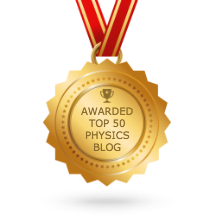 |
| Adding a Dimension, by Isaac Asimov. |
The only scientist who, it seemed to me, indubitably belonged to the list and who would, without a doubt, be on such a list prepared by anyone but a consummate idiot, was Isaac Newton.Asimov needed a name for these awards.
But how to choose the other nine?
I would be false to current American culture if I did not give the ten winners a named award… To go along with the Oscar, Emmy, Edgar, and Hugo, let us have the Isaac.In a footnote, he added
If anyone has some wild theory that the choice of the name derives from any source other than Newton, let him try to prove it.Below I list the Isaac winners in alphabetical order, and note which appear in Intermediate Physics for Medicine and Biology.
- Archimedes is not in IPMB. I suppose Russ Hobbie and I could have mentioned him in Chapter 1 in our section on buoyancy.
- Charles Darwin does not appear in IPMB. In my blog post about Darwin Day, I note that many of the physics principles we discuss—diffusion, fluid dynamics, thermodynamics—constrain how animals evolve, so topics in IPMB impact Darwin’s theory of evolution.
- Albert Einstein is in IPMB by name: once as the unit of a mole of photons, and again for his diffusion-viscosity relationship. As I noted in my blog post “Where’s Albert?,” his influence is felt in our analysis of special relativity and in the quantum theory of light.
- Michael Faraday is one of the leading characters in Chapter 8 of IPMB because of his discovery of electromagnetic induction, which plays the key role in transcranial magnetic stimulation. The unit of capacitance (the farad) and a mole of charge (the Faraday constant) are named after him.
- Galileo is never mentioned in IPMB. In my blog post about the book Galileo’s Daughter, I noted that Galileo analyzed the bones of differently sized animals. He would’ve fit well in the section of Chapter 2 about scaling.
- Antoine Lavoisier is absent. We don’t do much chemistry in IPMB.
- James Maxwell, one of my heroes, is mentioned by name once, in a homework problem in Chapter 8 about Maxwell’s equations.
- Isaac Newton; where do I begin? Russ and I use Newton’s calculus without apology. Newton’s 2nd law of motion is discussed in several places, but primarily in Chapter 13 on sound and ultrasound. Newton’s law of cooling appears in the homework problems of Chapter 3, his ideas on the nature of light are in Chapter 14, and the unit of force is the newton.
- Louis Pasteur was a great scientist, but isn’t in IPMB.
- Ernest Rutherford was added to the 5th edition of IPMB in a homework problem about his alpha particle scattering experiment. Russ and I discuss the different types of nuclear radiation in Chapter 17, but there we don’t mention Rutherford by name.
 |
| I, Robot, by Isaac Asimov. |
If you want to learn more about Asimov, read the essay “Asimov at 100: From Epic Space Operas to Rules for Robots, the Prolific Author's Literary Legacy Endures,” by James Gunn. When I was an undergraduate at the University of Kansas, I took a science fiction class taught by Gunn; the topic of my term paper was Asimov’s future history.
I’ll close with the description of Asimov’s birth from In Memory Yet Green: The Autobiography of Isaac Asimov (his 200th book).
When my mother went into labor, there was no one to help her, therefore, but a midwife, and the process took three days and two nights, during much of which she walked the floor, leaning on my father. The result of all that was myself, and I was named Isaac after my mother’s dead father. (A Jewish child is, by tradition, named after a dead relative.)
In Memory Yet Green:
The Autobiography of Isaac Asimov.
The date of my birth, as I celebrate it, was January 2, 1920. It could not have been later than that. It might, however, have been earlier. Allowing for the uncertainties of the times, of the lack of records, of the Jewish and Julian calendars, it might have been as early as October 4, 1919. There is, however, no way of finding out. My parents were always uncertain and it really doesn’t matter.Happy birthday, Isaac Asimov.
I celebrate January 2, 1920, so let it be.
Listen to “Nightfall,” a short story by Isaac Asimov.




No comments:
Post a Comment